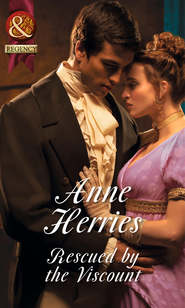По всем вопросам обращайтесь на: info@litportal.ru
(©) 2003-2024.
✖
Date with a Regency Rake: The Wicked Lord Rasenby / The Rake's Rebellious Lady
Настройки чтения
Размер шрифта
Высота строк
Поля
She looked up at him with such trust that he could not restrain himself. Bending down, Kit kissed her softly on her lips. A gentle kiss without the heat of passion, a kiss one would give to a child, designed to—what? He wanted to keep her safe, not to betray the trust he saw writ in her eyes. She persisted in seeing him as a saviour. Fleetingly, he wished it could be so.
He was bewitched. She needed to be saved from nothing except her own wiles, and whatever this scheme was she had embroiled him in. Hardening his heart, Kit stepped briskly away. ‘Wait here. They’ll need help coming aboard, and John will need help with the rest of the cargo too.’
Left alone to watch, Clarissa could only admire the sleek process of loading from the tiny dinghy tied loosely to the Sea Wolf’s side. The men worked in silence, broken only by hushed instructions from Kit to John and the French oarsman, as Monsieur Renaud and his daughter were guided with care up the ladder and on to the deck. Several casks of brandy, boxes of tea, and bales of fabric—silk, she assumed—followed, handled by Kit and John effortlessly and with a practice born of familiarity. The cargo was stowed in a small compartment reached via a trap door on deck, which was hidden beneath some fishing nets. The émigrés were ushered to the cabin below. The dinghy cast off back to shore, the oarsman having received a generous douceur for his troubles. John and Kit were preparing to up anchor and away.
Clarissa watched all of this with fascination, taking in every detail while at the same time trying to reconcile Kit’s strange behaviour. He believed her to be a fraud, and did not trust her, that much was obvious. Nor did he believe her story—and who could blame him, for it was indeed flimsy. Yet he had gone along with her proposition, none the less, for reasons she could not fathom. He was bored, true. And he found her amusing, that was also true. And tempting. That, too, Clarissa knew to be true, although she found it harder to believe, so many real beauties had he had, and no doubt would continue to have. Yet he told her she was beautiful, and she believed him, for he did not lie.
Well, the novelty would no doubt wear off, but it was flattering all the same. Still, none of this explained why he went along with her scheme. He wanted her, but he trusted her not. He seemed, as when he kissed her just now, to be fighting against more tender feelings, but each time he pulled her close he pushed her away all the harder. He believed her to be false, and she had herself conspired to ensure that he would do so.
There was nothing to be done. The situation was of her own creation and she would have to accept the consequences. It had been no part of her plan to fall in love, but she could not regret it, even if Kit would never know how she felt.
The rocking beneath her feet told her they had turned back out to sea. Sure enough, the sails were set and the land was falling away behind them. Monsieur and his daughter were below decks. Clarissa decided the best way to assist was to provide what comfort she could to the French family on the long journey ahead. They would be chilled, and no doubt hungry. She could do something about that. She slipped away from the rail and was below decks before Kit had even noticed she had gone.
Monsieur and Mademoiselle Renaud were huddled together on one of the narrow bunks, fatigue etched on their wan faces. Mademoiselle was young, fifteen or sixteen, and bid fair to being a beauty, but at the moment all Clarissa saw was a girl at the end of her tether and in need of comfort. Pinning a bright smile to her face, and summoning up her schoolroom French, she set about providing it.
Warm blankets were retrieved from a locker beneath the bunk, and the supply box Kit had tucked into a corner was opened, revealing a ham, cheese, bread and wine. The émigrés fell on the food with obvious relish, and were considerably cheered by the time they had made a good repast. The sea was smoother for the return journey, and fortunately neither of the new passengers was subject to sickness. Clarissa poured herself a glass of burgundy and settled down to conversation with the father and daughter, keen to find out their story for herself. Keen also to discover their opinion of their rescuer without Kit himself being privy to it.
It was as sad, sordid and harrowing a tale as she had ever heard. Yet Monsieur emerged from it with a quiet dignity, a respect for life and a trust in humankind despite all his experience. He had no wish to dwell on the details of the past, the worst of times, when his wife was held in captivity, the only certainty that of her death by the blade. He focused instead on the goodness of the people who kept his daughter safe in the country while he pleaded in vain with the authorities in Paris. Of their kindness in providing him with a roof over his head, food, even some work tutoring the village children. And the generosity of the people who offered him a new home in England.
Monsieur spoke perfect English. ‘Over the years before the revolution, my studies led to friendship with some eminent professors at Oxford university. It is these very good friends who offered sanctuary to myself and Lisette, my daughter, as soon as we got word out that we were alive.’
‘So, you’ve been planning your escape for some time then, monsieur?’
‘Yes, for more than a year now. My wife, Lisette’s maman, was killed by the guillotine three years ago. Until she died, we had hoped to survive in France, to simply wait until this madness, this terreur, was ended. But when my dear wife was executed—murdered …’
‘Papa, we must think of the future now, it is what maman would want.’ Lisette’s gentle voice, full of compassion, roused her papa from his maudlin thoughts.
‘You are right, ma petite.’ Monsieur Renaud heaved a sigh, and, fortified with another draught of wine, resumed his story. ‘We heard of the English monsieur and his rescues through another of my countrymen, but it proved difficult and time-consuming to make contact and the necessary arrangements. Easy to understand, given the need for secrecy and the danger to all concerned. But now, thank God, we are finally here.’
‘The expense must have been a big problem for you?’
‘Oh, no, mais non, madame, there was no cost. Monsieur never takes a fee for his rescues, nor even a gift—and he has been offered many. Not once, in many, many attempts, has he been caught. Not one passenger has he failed, even when he had to wait in France, at great danger to himself. He is a hero.’
Clarissa smiled, wishing just for a moment that Kit was present to hear himself being described in the very terms he had denied so vehemently only hours before. She had been right about him, but it was reassuring to have it confirmed.
‘Yes, I believe he is a hero, monsieur, would he but admit it.’
‘We are not even permitted to know his name, madame.’ Lisette joined in the conversation now, her pretty face animated, the only traces of the frightened little girl who had boarded the yacht showing in the lines of exhaustion. ‘He is known as the Loup de Mer, the name of this yacht, and I think it suits him, non? He is just like a wolf, is he not, so dangerous, and so brave. But you, madame, you must know him well to be here on the boat with us. Tell me, is he of noble birth, as they say he is?’
Clarissa blushed, for Lisette was obviously curious as to her relationship with Kit, even if she was too polite to ask. ‘I think, mademoiselle, that if he wished his name to be known he would tell you. It is not for me to give away his secrets.’
‘Well spoken, my dear, my secrets are nobody’s property but mine.’
Kit entered the tiny cabin with his usual cat-like grace, making the room suddenly seem much smaller. The cynical smile was firmly in place, the slight frown drawing his black brows together demonstrating clearly that he had overheard enough of the conversation to know Clarissa had been asking questions.
‘My aunt always told me that listeners hear only ill of themselves, you know. You are fortunate you didn’t arrive any earlier.’
‘Ah, so you have an aunt, as well as a mother. Quite a little family gathering there will be awaiting you on your return from your trip. And what, pray, would I have overheard that would have been so unwelcome to my ears?’
‘Why, sir, only what I told you myself, and to your face. You are a hero. And it came this time not from my lips, but from those of Monsieur Renaud here.’
‘And, oh, monsieur, it is true. To us you are a hero, je vous promis.’ The worshipful tone of Lisette’s voice could not be ignored, but instead of taking umbrage with her, Kit laughed.
‘Merci du compliment, mademoiselle. But I didn’t come here to discuss my character, I came to remind you of your promises to me. We will be in England soon. A chaise awaits you, to take you to London and thence to Oxford. Once you are disembarked, you must not discuss this journey, nor may you tell any of your friends still in France how you came to contact me. From tonight, the Loup de Mer is no more. You have the honour of being my last passengers. And after tonight, even if we meet in the street, you must not recognise me. Is that understood?’
‘But why? Monsieur, I do not understand why?’
‘Lisette!’ Monsieur Renaud laid a constraining hand on his daughter’s shoulder. ‘Tais-toi. I speak for both of us, monsieur, when I say that it shall be as you demand. But I beg you, if you should ever be in need of a friend yourself, to consider me your eternally grateful servant.’
‘Thank you, monsieur.’ Only Clarissa realised that the curt tone hid Kit’s own pleasure at the compliment. ‘Now, I will bid you adieu. I will be busy on deck until we disembark. I am sure that madame here will look after you well. She is adept at it, I can vouch.’ A brief nod and a smile, and he was gone.
Clarissa settled Lisette down to sleep on the narrow bunk, letting her head rest on her own lap, soothing her into slumber by stroking her hair as she had done with Amelia countless times. After a while, Monsieur Renaud slept too, more fitfully, uncomfortably upright on the bunk opposite, and Clarissa sat watching over them, her own mind too tired to grapple with the travails that lay ahead when they arrived back in port.
Finally she too dozed off. She woke briefly to see Kit hovering over her, tucking a blanket round her, but he put a finger to his mouth and left as silently as he had arrived, so she smiled faintly, and turned to a troubled sleep once more.
When Clarissa next opened her eyes, the porthole revealed a choppy iron-grey sea rising to meet the pale dawn sky. It was morn, though she had no idea what o’clock. Even with a poor wind, they must be near home. Gently, so as not to disturb Lisette, still soundly asleep on her lap, Clarissa rose and stretched, stiff and sore from lying on the rough planks that passed for a bed. Her eyes felt gritty from the briny salt of the sea-spray, and she was ravenously hungry. She had not eaten since the inn, which seemed like long ago now, though it was only yesterday. But breakfast would have to wait until they landed, and she had a suspicion that once they were safely ashore, breakfast would be the last thing on her mind.
The yacht was slowing, but she could see nothing from the porthole to tell her their position. Steadying herself to go above decks, she was stilled by the sound of strange voices, and waited, suddenly alert to danger. The cabin door opened abruptly and John appeared, his face creased in worry.
‘Master says to stay down there, and make no sound. There’s a cutter coming alongside, they mustn’t find you.’
‘A cutter? Do you mean a customs ship?’
‘Aye. They’ve been tipped off, must’ve been, as they were lying in wait for us. I warned the master after the last time that someone was informing on us. And this time they want to board. They must be certain sure of their information.’
‘But can’t you prevent them boarding?’
‘Master Kit’ll try, lady, but they do seem mighty determined this time. And Master Kit, happen he’s riled that Lieutenant Smith once too often. The lad’s got summat to prove.’
Looking desperately round the tiny cabin, Clarissa realised there was nowhere for them to hide. The brandy casks were in the hidden compartment on deck, but no Riding Officer worth his salt would fail to discover the hiding place if he was permitted a thorough search. Looking anxiously at the still peacefully sleeping émigrés, Clarissa knew that if the customs men found the brandy they would almost certainly want to search the cabin too, where, unknown to them, a much more valuable cargo was stored. They must be prevented from searching or the game was up for them all. And if Kit couldn’t stop them, she thought, a plan forming in her mind, well, then she would have to.
Something of her thoughts must have shown on her face, for John was entreating her to remain in the cabin and stay quiet. ‘Do as Master Kit commands and don’t even think of doing anything silly or you’ll get us all hanged.’ With this, he closed the cabin door firmly on Clarissa’s face and returned above decks.
‘I must command you to allow us to escort you into port, Lord Rasenby. We have a warrant to search the Sea Wolf.’ Lieutenant Smith stood stiffly on the deck, his dinghy tied alongside in the calm waters of the channel, his cutter swaying a few yards off and behind the yacht.
‘This obsession with my night-fishing trips is becoming tedious, Lieutenant. I thought you would have better things to do with your valuable time.’
‘You have been less fortunate than usual, my lord, from what I can see?’
‘I don’t take your meaning.’ Kit’s temper, usually so cool under pressure, was frayed. Never before had they been unable to outrun the customs men, and he cursed the ill luck which had seen the wind drop suddenly. The thought of the Renauds and Clarissa hidden below decks made him nervous, more nervous than the thought of the cargo concealed in the secret locker. He had no clear idea of the law regarding the émigrés, but he had a very clear idea indeed of what would happen to his reputation if this story got out.
‘My meaning, my lord, is simple. Where is your catch?’
Cursing volubly under his breath, Kit turned helplessly to John, who shrugged in consternation. They had caught no fish.
‘As you say, I was unlucky last night, Lieutenant. Come now, we both know this is foolish. I am in need of my bed, as I’m sure you are of yours. Nothing can be gained from searching us, for there is nothing to be found.’
‘Perhaps your catch is below decks, my lord?’











